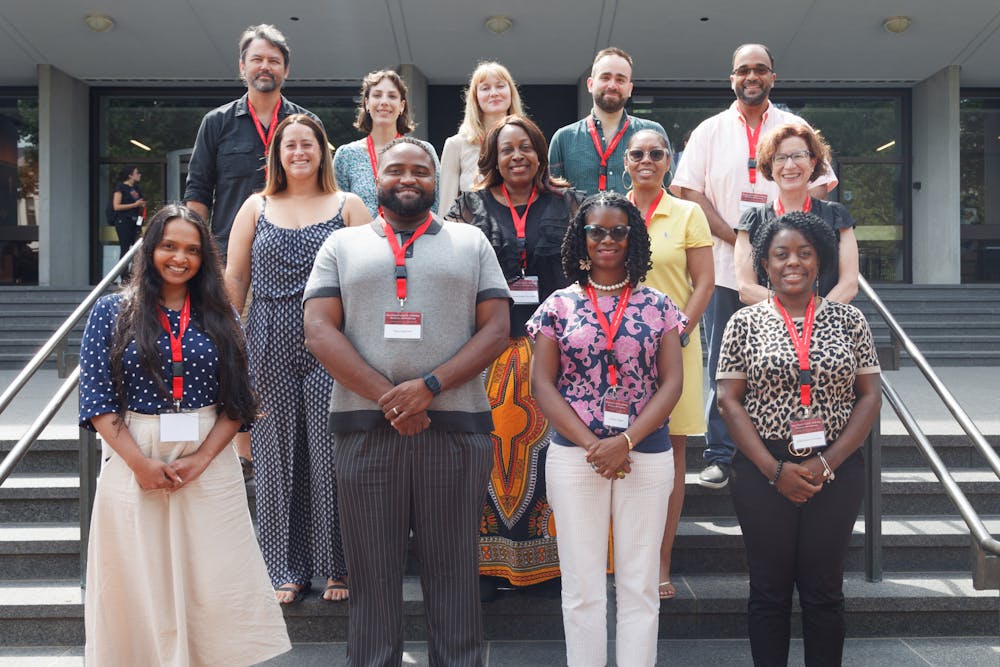Following a three-week inaugural session last summer, the Born-Digital Scholarly Publishing Institute met last week in a virtual follow-up meeting to discuss the status of cohort members’ born-digital projects. The institute, founded in 2021 by the University Library with a grant from the National Endowment for the Humanities, aims to provide technical support and mentorship to faculty and administrators from under-resourced institutions seeking digital publication opportunities.
Born-digital material, often called digital-first material, refers to content that is created for a digital environment, such as websites or interactive maps, according to Allison Levy, director of Brown University Digital Publications and the project director of the Born-Digital Institute.
The demand for born-digital content is stronger than ever, yet the supply is still limited to a well-resourced minority with access to technical training, she said. This divide threatens to put digital publication “at risk of becoming the preserve of elite institutions,” according to the institute's website. The institute aims to bridge this gap by equipping scholars with the tools to create and publish their own born-digital projects.
Levy said that the institute was established to “diversify who was producing born-digital scholarship” in academia. Brown University Digital Publications, which is based in the John D. Rockefeller Jr. Library, works with University faculty from the humanities and social sciences who want to create publications beyond the traditional leather-bound book.
Digital Publications has provided University faculty and fellows with support since its formation in 2015, but the program began to look outward in 2021, Levy said. “There was always an interest in making this more accessible (and) finding ways to open up this opportunity beyond our own faculty, beyond our own campus,” she added. “The NEH grant enabled us to design a summer institute specifically for scholars from less well-resourced institutions.”
The result was the Born-Digital Scholarly Publishing Institute, which launched its first training program on July 11 with a two-week virtual session. Fifteen scholars from all career ranks representing 13 academic institutions — including five Historically Black Colleges or Universities — were invited to the program. “We were very pleased to see the interest from HBCU scholars in this program,” Levy said. “Diversity, equity and inclusion (were) really at the core” of the institute.”
During the program, the cohort attended presentations ranging from big-picture project management to copyright and fair use policies, according to Levy, in addition to learning basic skills in software such as Scalar, Manifold and WordPress. Several Brown faculty and designers also conducted seminars centered around their own digital works.
All presentations were recorded and uploaded to the institute’s website with the intention of future use and reference by other scholars. “That content is available now to anyone, and is freely accessible,” Levy said.
In the third week of the program, the cohort brought their projects and initiatives to Providence. Scholars met in the Patrick Ma Digital Scholarship Lab in the Rock, where they spent the next five days workshopping their initiatives with a team of designers, digital humanities librarians and editors.
Crystal Brusch, a designer for Digital Publications, led three sessions across the first two weeks on project management, Scalar and design considerations. Brusch specializes in interactive storytelling and web design, skills that constituted the foundation of her trainings. In the third week, Brusch met with the cohort to help participants “pinpoint actions they can take to bring their thoughts to life in these digital publications,” she said.
Takeia Anthony, interim dean of the Whitney Young Honors Collegium and Graduate Studies at Kentucky State University and a program participant, emphasized the collaborative environment of the program. “I learned so much from my colleagues and about the interdisciplinary connection that we all share,” Anthony said.
Anthony’s project, “We Can Do it for Ourselves,” centers the impact and importance of Black female philanthropy in Delta Sigma Theta Sorority Inc., a historically African American sorority founded in 1913 at Howard University. Anthony is documenting the 56-year history of the Delta Research and Educational Foundation — which has funded research and scholarly achievement for African American women since its inception in 1967 — through archives and interviews.
Anthony said that the Born-Digital Institute helped her narrow her design focus and introduce a variety of digital mediums through which she can share her findings. “I’m still shopping around to see which platform works best,” Anthony said. A born-digital publication allows her to include the numerous oral interviews she has conducted for the project, which she says “can let the women speak for themselves.”
The institute has held several virtual check-in meetings since the conclusion of the summer program to allow participants to provide updates on their projects and offer feedback. Levy intends to follow up with the NEH in the hopes of establishing the institute as a biennial summer program starting in 2024.
“It takes time to develop these projects,” she said. “To have the opportunity to advance these excellent projects knowing (that) they are going to make such enormous impacts in their disciplines and within their communities … made this so special.”
Benicio Beatty is a staff writer and a copy editor. He is studying Public Health on the pre-med track. In his free time, Benicio enjoys playing with his dog Tivoli and constructing time capsules.





